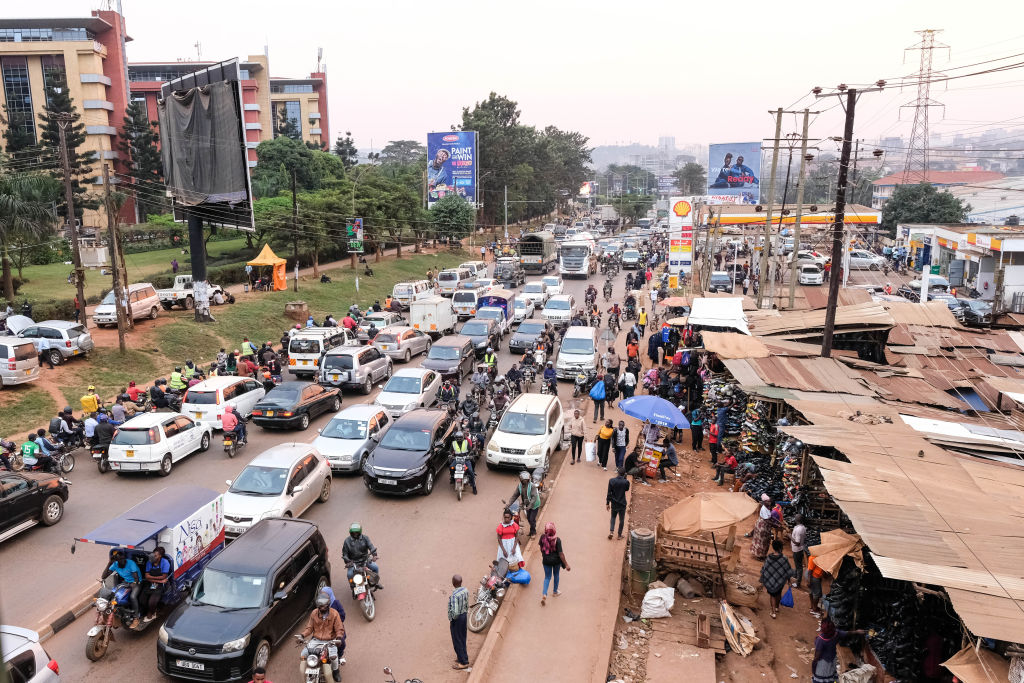At Uganda’s border crossings with Kenya and Tanzania, every vehicle entering the country gets fitted with a new license plate that lets the government track it and monitor the driver’s activity.
The foreign vehicles join tens of thousands of Ugandan cars, trucks and motorcycles that have been outfitted since January with so-called digital license plates under a 10-year contract the government signed in 2023 with Russia-based Joint Stock Company Global Security.
The Russian company controls the system, known as Intelligent Transport Monitoring System (ITMS), and gets paid through hefty fees for each license plate and equally heavy fines levied against vehicles caught speeding on Kampala’s streets.
The system embeds each license plate with a radio-frequency identification (RFID) chip that lets the government track the vehicle in real time. A QR code printed on the license plate gives police immediate details about the vehicle and the driver during an encounter.
Government authorities say the system, which integrates with Kampala’s Chinese-made closed-circuit TV network, is designed to improve road safety and reduce crimes such as car theft. The system helped the government return 32 stolen cars and 13 motorcycles to their rightful owners so far this year.
Critics note the connected system gives Russian and Chinese companies extensive access to Uganda’s surveillance network and the data that comes with it. They add that the system lacks the safeguards needed to keep the government from turning it into a surveillance network that could be used to suppress human rights groups, dissidents and government critics.
“For the case of Uganda, where we lack robust legal and institutional safeguards, the ITMS risks becoming less about traffic safety and more about surveillance,” Brian Byaruhanga, a technology officer at Collaboration on International ICT Policy for East and Southern Africa, told Uganda’s The Independent magazine, which recently investigated the system.
Others point out that Russia may be encouraging other countries to follow its example and use technology to monitor and control the actions of citizens.
“Russia’s own surveillance apparatus has been weaponized against activists and journalists,” analyst Richard Ngamita wrote recently for the civil society organization Thraets, which promotes technology in support of democracy.
One thing is clear: The system is a potential cash cow for its Russian owners while also being a likely threat to Uganda’s personal privacy and data.
Each digital license plate costs the vehicle owner more than $205, about 20 times the daily income for the driver of a boda boda, the ubiquitous motorcycle taxis of Kampala, Uganda’s capital. Drivers who fail to install a digital plate risk being fined.
On top of that, drivers on Kampala’s roads can be fined nearly $60 for minor traffic infractions, such as violating the speed limit on local roads. Fines are generated automatically by the ITMS Express Penalty System and sent to drivers via mobile alerts. The system proved so controversial that it was suspended earlier this year after drivers complained about the scale of the penalties, as well as the system’s data errors and conflicting speed limit signs.
Critics argue that beyond safety enforcement, ITMS and the Express Penalty System are primarily revenue streams for the Russian contractor. The lack of transparency about the contract, the company, and the control of Ugandans’ personal data have also raised red flags among critics and human rights advocates.
“Who audits Global Security?” Ngamita asked on the social media channel BlueSky. “What stops this data from being sold to third parties or used to target opposition figures?”
The Ministry of Works and Transport refused to provide reporters with The Independent access to or even the location of the factory in the Kampala suburb Kawempe where Joint Stock Company Global Security employs Ugandans to make digital license plates.
“This factory serves as the critical rollout center, making a foreign company the gatekeeper of a national security system,” Ian Katusiime, a reporter for The Independent, wrote recently.
The same Russian company replaced the Ugandan company GM Tumpeco to fit incoming vehicles with digital plates at border crossings in Malaba and Mutukula. The Independent estimates the Russian company installed 27,000 digital license plates on vehicles in July alone.
“Citizens need to know what data is collected and how it’s used,” Byaruhanga said. “Without independent oversight, surveillance systems like ITMS can easily be weaponized against the very people they claim to protect.”

